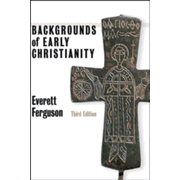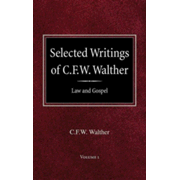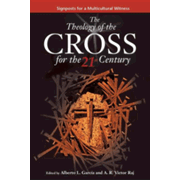OUR BIBLE lesson for the Sixth Sunday after Epiphany is read
from the Gospel According to Saint Matthew. Following the theme established by
Jesus in last week’s study, in the Sermon on the Mount... we find our Lord here explains how we are called to
go farther than unbelievers in their attempts to adhere to the Law. This is to
occur because we are founded in sure acceptance by the Gospel message.
"You have heard
that it was said to the men of old, 'You shall not kill; and whoever kills
shall be liable to judgment.' But I say to you that every one who is angry with
his brother shall be liable to judgment; whoever insults his brother shall be
liable to the council, and whoever says, 'You fool!' shall be liable to the
hell of fire.
So if you are offering your gift at the altar,
and there remember that your brother has something against you, leave your gift
there before the altar and go; first be reconciled to your brother, and then
come and offer your gift. Make friends quickly with your accuser, while you are
going with him to court, lest your accuser hand you over to the judge, and the
judge to the guard, and you be put in prison; truly, I say to you, you will
never get out till you have paid the last penny.
"You have heard that it was said, 'You
shall not commit adultery.' But I say to you that every one who looks at a
woman lustfully has already committed adultery with her in his heart. If your
right eye causes you to sin, pluck it out and throw it away; it is better that
you lose one of your members than that your whole body be thrown into hell. And
if your right hand causes you to sin, cut it off and throw it away; it is
better that you lose one of your members than that your whole body go into
hell.
"It was also said, 'Whoever divorces his
wife, let him give her a certificate of divorce.' But I say to you that every
one who divorces his wife, except on the ground of unchastity, makes her an
adulteress; and whoever marries a divorced woman commits adultery.
"Again you have heard that it was said to
the men of old, 'You shall not swear falsely, but shall perform to the Lord
what you have sworn.' But I say to you,
“Do not swear at all, either by heaven, for it is the throne of God, or by the
earth, for it is his footstool, or by Jerusalem,
for it is the city of the great King.”
And do not swear by your head, for you cannot
make one hair white or black. Let what you say be simply 'Yes' or 'No';
anything more than this comes from evil.
(Matthew 5:21-37)
 |
Backgrounds of Early Christianity, Third Edition By Everett Ferguson |
Radicalizing Law
With the present debate over granting immigration to persons
foreign to the United States, and the tension found between the security of our
neighbors as weighed against right welcome for the stranger, we need to ask where
the Christian should stand? Jesus told his disciples, as recalled by Matthew,
how we are to exceed the righteousness of the scribes and Pharisees.
As we know, Jesus had a running debate with participants from the religious
powers of his day. During those confrontations, as Matthew related to his community, Jesus took
the interpretation of the Mosaic Law to a far realm… into the soulful convictions
that drive a person. In our reading, therefore, we Christians have comparisons made
between outward demonstrations of righteousness and our inward motivations.
According to Matthew’s
telling, Jesus indicated in the Sermon on the Mount that the righteousness of
the scribes and Pharisees could be thought of as strictly outward. He accused that they
made shallow ceremonial gestures for show. He then followed that true Righteousness in
the kingdom of God goes far deeper. As such, we who are his followers are yet called to strive
and accomplish these tenets.
For example, first
note that our Lord took the mandate against murder found in Exodus 20:13, and
radicalized this Law for his followers. He taught those who would be his Church that the spirit behind the
act of murder is based in selfishness and anger… and not love. Therefore,
"raca" (shame) on us, is spoken by him as a word of contempt… fittingly used
against a brother suffering condemnation.
Also, Jesus taught
that shouting "Thou Fool!" to another person would subject the guilty
one voicing the epithet to "hell fire". It was considered better to be blind than to be
guilty of this type of contempt. When guilty of such, a person was consigned to
walk in Sheol or Gehena (hell), and hell was the place best described by the physical
valley of Hinnom, wherein human sacrifices were formerly offered. That place was
considered to be identical with the hellish “the lake of fire.”
 |
Selected Writings of C.F.W. Walther Volume 1 Law and Gospel By C. Fw Walther, Aug R. Suelflow(ED.) & Herbert Ja Bouman |
These radical references show us God's expression of punishment for our sin, and are presented for us so that we may
intensify our thanksgiving for the salvation we now have in Christ. Selfishness and anger
are here found as the unjust motivations behind murderous killing, so our Lord
admonished his community to see beyond condemnation of the act itself... to the
very thoughts and emotions that spur the deed. As God’s people, we are called
therefore toward our internal releasing of whatever murderous cause…. i.e. “Let it go!” is interpretive here.
This soulful release enables life and love to be freely given both to us and
from us.
As we read in the
letters of John.…
“We know that we have
passed out of death into life, because we love the brethren. He who does not
love abides in death. Any one who hates his brother is a murderer, and you know
that no murderer has eternal life abiding in him.
By this we know love, in that he laid down his
life for us; and we ought to lay down our lives for the brethren.” (1 John 3:14-16)
Subsequently, the
reading in Matthew moved his community forward in their hearing about the radicalization
of the Law. Jesus had taken his original followers beyond highlighting the outward killing
to our noting of the inward wanting ill upon another… even if just to be found in
the human spirit.
Jesus expressed that Christians are to let go of this motivation. We are
to stand against murder in both behavior and attitude for all stages of human
life… from its embryonic beginning… and onward until the natural end of our lives.
We are to “love our neighbor as ourselves” and we are to warily consider this mandate whenever we choose to end the life of an unborn child, a military opponent, or enable death to overtake a terminally ill patient or person of advanced age.
However, we must note with
certainty that these radical statements are important whenever sinful
persons are forgiven and enabled by the Spirit of Christ. Only when we are in the Holy Spirit
can we let go of that which is keeping the angst or fear in place without fostering the
growth of bitterness. We as Christians were called by Matthew to be anchored only in Christ Jesus and subsequently become empowered by that stability. This is to be so
in our lives... whether or not the stumbling block is deemed as powerful as a false
earthly king... or as lowly as an unwanted pregnancy.
Today we can ask why
this dialog was so highly developed for Matthew’s community, yet omitted for
the churches of Mark or Luke? Were the meanings of scribal and Pharisaic
legalisms much more highly pursued in Antioch… so that they became a pronounced
theological issue for the early Church? As well, we ask whether the traditions stemming from the Law blocked the
path of righteousness more so in that devout community?
We can see where righteousness
(“sedekah” in Hebrew) was shown in the Law and the prophetical writings, but it was a quality
that was not attainable by sinful humanity. This perfection could only be
acquired through the gift from the “Righteous One”. Continued reading in Matthew
identifies the historic identity of that singular person.
Certainly, we might
wonder whether the synagogue community, as long-lived historically... was pressured
greatly by their pride, so to adhere tightly to historical legal traditions and arguments. We
then also ask why blessed Matthew included not only those things which were earlier
written in Mark, but also supplied these tenets from the “Q” (quelle’) document. Surely
these were not just filler articles written into the gospel about the life
of our Lord. My thought is that this
section was indeed paramount for Matthew’s church.
 |
The Chosen: Seasons 1 & 2, DVDS By The Chosen, Llc |
The issue of radicalization was important not only for the faithful keepers of the Law, but also for those who would too easily toss it aside. We may rightly wonder whether there were persons in that break-away Christian community who were not upset over tossing the Law aside. We ask whether these may have possessed a mindset that would too easily declare that they were entirely “free” in Christ from the Law. If so, they may have claimed that Christian salvation permitted them to continue all sorts of behavioral laziness, debauchery and offense. Looking at our modern Church and society and the relaxation of moral requirements for clergy and laity alike… and our persistent controversy over Christian “freedom” or “bondage” that has persisted since the Reformation era… it seems very likely that this was certainly true. The dichotomy persists for the Church to this very day.
![562804: The Bondage of the Will [Hendrickson Publishers]](https://ag.christianbook.com/dg/product/cbd/b180/562804.gif) |
The Bondage of the Will [Hendrickson Publishers] By Martin Luther |
With a radical voice,
Jesus addressed the issue of adultery as found in the Law (Exodus 20:14). Our
Lord voiced condemnation for Christians so that even a lustful look was considered
as adultery “in the heart”. What followed is thus considered as a “hard” saying.
Jesus so radicalized the Law and its inescapable condemnation of sin that he
stated just how far it was considered necessary to go… for prevention of
marital betrayal. He stressed the point so much that our Lord said even the gouging of eyes and
severing of limbs were preferable alternatives to be considered.
Was our Lord serious
here with that drastic statement? While many scholars believe that this is a
figure of speech and is not to be taken literally, I see the saying as the
expressed seriousness that Jesus placed on marital infidelity…. for both men
and women! He provided that the sole ground acceptable for divorce as that of “unchastity.”
In this he therefore echoed the accepted legal opinion of Shammai, as a contemporary
rabbinic lawyer. However, the emphasis that Jesus placed on this issue
for Christians… is that we are called to live beyond mere legalisms, let alone the condemnations
laid upon a society which largely ignored women’s rights while the contemporary male
counterparts were rampantly unchaste.
This radical teaching
revealed that our Lord taught us that Christians are to apply the loving intent of marriage. According to Jesus, marriage is to be an enduring
human relationship established by God as a permanent foundation for family security
(see Matthew 19:3-8). Our Lord firmly condemned divorce… whether initiated for
reasons of incompatibility, inconvenience, or abuse… as proof of “hardness of
heart”. In today’s frivolous culture
where divorce statistics soar, we need to clearly hear this Word of God. We
need to recover the permanent, loving intent of our Creator by begging
forgiveness and asking his Church for spiritual empowerment in marriages.
Jesus’ discourse
continued in Matthew with his command against swearing. First, let me clarify
that there is no reason for us to consider that a solemn oath made in a
court of justice or on other proper occasions, are forbidden to us. This is provided
they are taken with due reverence and not for the membership of exclusionary groups. I offer that the comments Jesus made
do not forbid this legal use, but rather raise issues against profanity…,
including expletives found common in our everyday speech. Jesus spoke more to a
person’s character, in that our word as Christians should always be beyond even
a hint of reproach. The words that we speak beyond “yes” or “no” are to be
strictly put forth in the Truth… and Christ Jesus is Truth personified. All profanity and falsehoods are to be far from our lips.
 |
Don't Give the Enemy a Seat at Your Table: It's Time to Win the Battle of Your Mind... By Louie Giglio |
Go the Distance!
In all of this, we
see that daily waging war with sinful desires of the heart need be attended to... with even
pain-filled and constant exertions. This effort should be done by us in loving Christian
witness. This is true in all matters. We are called to give until it hurts... and then
give more!
Jesus taught and endured great pain to save us from our sins,
not anchor us in them. Indeed, all of our
senses, powers and prayers must be heightened in order to keep us from those
things which further our alienation from God. Those who commit transgressions
and lead others into temptation to sin in any sense… and then attempt to justify
themselves saying that they are freed in the gospel… only make themselves guilty
of greater offense. They will be held accountable.
If painful separation occurs from our leaving behind sinful activities, so that our lives are improved… should not that pain be measured as minuscule when the salvation of our souls has already been greatly awarded?
If painful separation occurs from our leaving behind sinful activities, so that our lives are improved… should not that pain be measured as minuscule when the salvation of our souls has already been greatly awarded?
We must conclude therefore that Jesus did not toss aside the Law;
he intensified it! Though completely innocent of wrongdoing, he took our excruciatingly punishment
on the cross and delivered us from eternal captivity.
Today we still individually and collectively fall short of keeping the commandments, let alone these radical statements. No Pharisaic wrangling will usher us beyond condemnation. Yet, thanks be to God working through his Spirit, that there is mercy within the requirements of the Law. They drive us to the foot of the cross.
Today we still individually and collectively fall short of keeping the commandments, let alone these radical statements. No Pharisaic wrangling will usher us beyond condemnation. Yet, thanks be to God working through his Spirit, that there is mercy within the requirements of the Law. They drive us to the foot of the cross.
You see, only through the Holy Spirit driving us to claim Christ crucified for us can we view these as the right loving of God and one another. This theological claim needs to be
stated repeatedly to those with legal mind. The knowledge of grace was and is still
needful, and is provided through faith given to us by the Holy Spirit. According to
scripture, instead of eternal death under the Law, we are saved by the sacrifice of Jesus
Christ. You see, Jesus paid the penalty for our sinful legal squabbles which sidestep and ignore these Commandments. He gave up his life, completed his graceful work, and after three
days lovingly rose from the dead. Consequently, believing this in faith
through the power of the Holy Spirit and working through scripture we are joined
with the early Christians of Matthew’s churches. With them we are called to declare redemption
in spoken or written form. This message is thus made available for modern, scattered peoples cowering
before eternal judgment. During the upcoming season of Lent, let us take a knee and receive these teachings and consolations
that enable us to go forward proclaiming the kingdom of God.
Know this! I repeat here that the radicalized Law exists to convict us and drive us to seek salvation in Christ Jesus. and so is also providentially useful for the guidance of civilizations around us. Take heed that even while we live in a world where murder
and abortions occur, divorces are granted... and Christian persecutions happen in
this and other lands around the globe... we are still called to try and try again. No progressive utilitarian political stance shall overcome this. The publishing of Saul Alinsky's "Rules for Radicals" is basis for demonic, atheistic absurdity. Almighty God rules as judge. As the right view of the scripture occurs, we come to believe in Christ and are freed by the Holy Spirit to try again. We, who are convicted and driven
by the Law are thus chosen by grace as saved through faith given to us in Christ. From this position we need to
lend ourselves unto the clear declaration of the Word of salvation to others... in both Law and Gospel. Thanks be
to God.
We offer this personal video as Christian outreach in today's everyday world...
May The Peace of God Be With You!



No comments:
Post a Comment